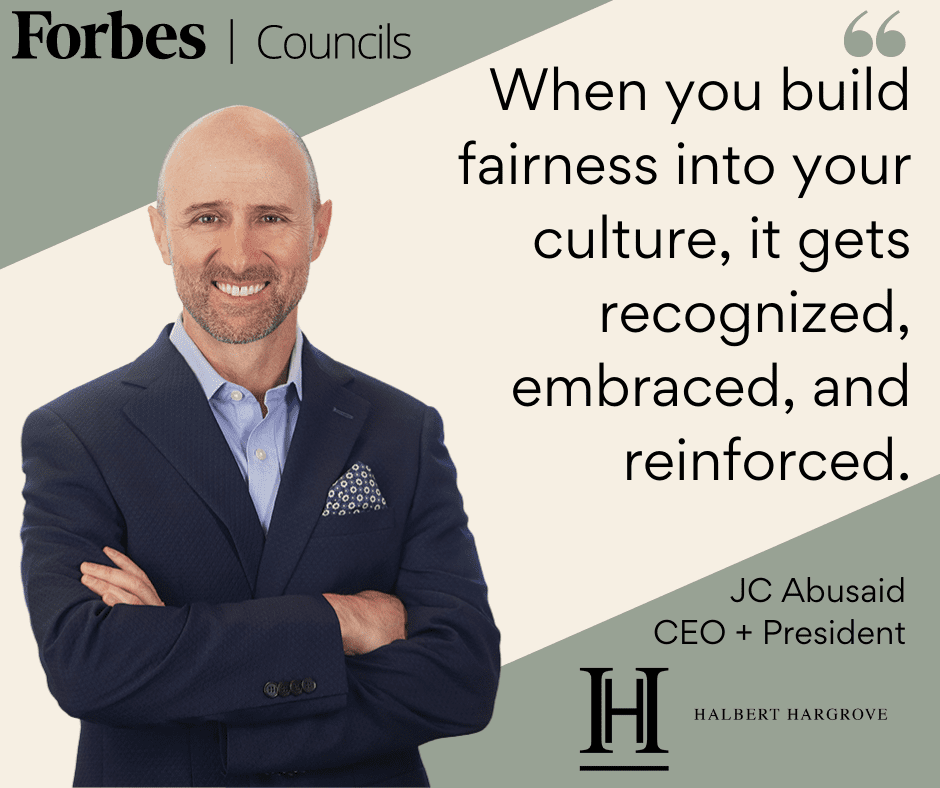By JC Abusaid, CEO/President as Featured in Forbes
How can you enshrine fairness in your company’s practices, culture and structure? While I don’t have all the answers, I’ve given a lot of thought to this over the last three decades.
I’m an immigrant born and raised in Bogota, with Middle Eastern family roots. I’m also a CEO. These days, I’m mostly perceived as a white man. Being perceived differently has opened up invaluable perspectives. When I first came to the U.S. in my 20s, the discrimination I experienced was a profound teacher. Here’s one example: Having a Middle Eastern last name during the Gulf War was not a business asset.
In Colombia, it can take three to 11 generations for people to break away from poverty. The classism there was a big reason why I left. One of the most important things I brought with me when I started with my firm is honed-in sensitivity. When I see a lack of fairness or civility or equal opportunity, I go after it with passion, focus and purpose.
What follows are examples of ways you can ensure a level field of opportunity for your workforce and potential hires. They’ve helped our firm, so maybe some of these ideas can benefit your firm’s efforts too.
When recruiting, think outside the box.
With every job opening, you have the opportunity to reach out to people who might traditionally be overlooked. Our firm’s internship program has become our workforce’s biggest pipeline, so we devote a lot of out-of-box thinking to keep at our diversity goals. This includes communicating with the business and finance departments of all our local colleges and efforts to get the word out to student groups like international students and minority associations.
It also helps to remember that your next great employee may cross your path in unexpected places. For example, one of our senior team members was discovered by a staff member in the lobby of our building. She was working in the newsstand while pursuing her undergrad studies. Her initial interview with the firm blew us all away.
Also on the fairness spectrum: Build a hiring process that has different components, so you can discover as much as you can about a candidate’s character and who they are as an individual. People shine or reveal big character deficits in different ways and settings. It could involve taking them out for coffee to uncover these attributes.
The candidate’s potential teammates also should be given the opportunity to weigh in. Can they work with this person? What’s the skill set? What can they contribute to the team? Having teammates sit in on a group interview or having them interact with them meaningfully in some way can help provide a balanced view of the candidate.
For us, striving for diversity and fairness in our hiring continues to be a marathon. We’ve made strides over the last decade, but we know we need to keep working at it.
Build a culture that cultivates fairness.
When you build fairness into your culture, it gets recognized, embraced and reinforced. Fairness and justice are positive cultural drivers for your company—and as we all know, a positive culture gives back.
One of the ways we walk the talk is our open-door policy. Any associate can walk into my office to talk shop or discuss work-related challenges. Castes and pedestals suck the life out of a company’s culture, and approachability from the top down sets the tone.
Taking this one step further, how creative can you be in generating opportunities for associates to weigh in and collaborate? Over time, we’ve worked out ways to ask questions, survey our employees and hold breakout sessions during meetings to make sure that everyone has a voice. Some people simply need more encouragement to share their perspectives. And as CEO, I try to weigh in last in a big group when people are making observations. That way others don’t feel pressured if they happen to disagree. Diversity of ideas feeds growth.
Finally, no one should get a pass on treating everyone else fairly. Don’t shy away from firing people who are jerks to others—even if they’re great producers.
Managing employees well gives them opportunities to thrive.
Managing people well is not as simple as it sounds. For example, we made a conscious decision to take that responsibility away from our advisors several years back. It was a great decision for them, allowing them more time to focus on what they do best—managing clients—and great for the people they managed too.
Helping employees thrive in their roles while being productive means staying thoughtful and deliberate about the ways you can create positive impacts. Offering a mentoring program can give employees access to the insights of a seasoned colleague, diversifying away from the single point of view of their manager.
We’re also strong believers in investing in new directions for talented, hard-working people when they aren’t happy in their roles. I discussed the benefits for your business and your people in my last article.
We’re all in this together.
Creating an environment that doesn’t play favorites, where people feel safe and rewarded in offering ideas, making constructive criticisms and bringing their best, true selves to the workplace isn’t just doing the right thing; it’s doing the smart thing. It can help in terms of employee retention, workplace satisfaction and business growth.
As a reminder to myself, I still hang on to the old notepad I made when I came to this country and was working in sales.
After getting yelled at and having doors slammed in my face because of my Middle Eastern name, I took my mother’s maiden name. Seeing that JC Smith in print is a great motivator for me. As business leaders, we all need to lead in prioritizing fair practices for our employees, clients and communities.


